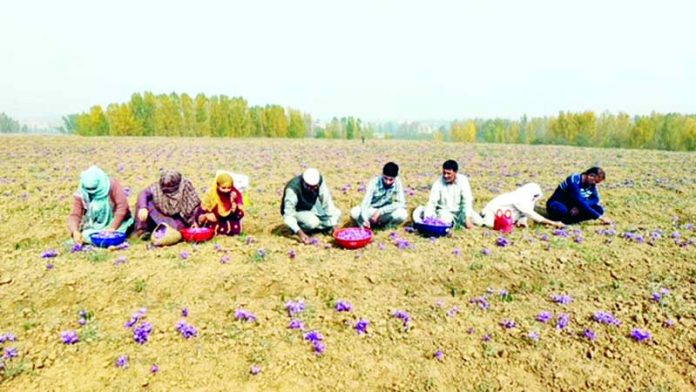
85 borewells functional, but no one to operate them
Suhail Bhat
SRINAGAR, Nov 16 : After two consecutive productive seasons, saffron production in Kashmir is expected to plummet this year due to a lack of timely rainfall, prompting growers to call for an investigation into the funds spent under the National Saffron Mission, which they say has failed to address rainfall deficits.
Follow the Daily Excelsior channel on WhatsApp
In Pampore area of South Kashmir’s Pulwama district, renowned for its high-quality saffron, farmers are voicing concern over the failure of irrigation systems, despite the National Saffron Mission (NSM) being introduced over a decade ago to boost production and protect crops from adverse weather. This year, the crop has suffered due to a nearly drought-like situation in September and October, the months when irrigation is most needed.
“Insufficient precipitation has severely impacted this year’s yield. The Government has provided us with irrigation facilities in the form of wells, but they are not working. I request Chief Minister Omar Abdullah to look into this matter,” Mohammad Arafat Gania, a saffron grower from Pampore, said.
According to the Planning and Agriculture Production Department, 128 deep borewells were sanctioned under the mission, of which 123 have been constructed by the Mechanical Engineering Department of Kashmir. While 85 of these borewells are connected to sprinkler irrigation systems covering 30 hectares, the facilities remain underutilized. This is because no user groups have been formed to operate and maintain the bore wells, nor have they been handed over to farmers as required by the mission guidelines.
The NSM’s irrigation system, designed to alleviate drought issues in the region, includes water supply pipes and sprinklers. Despite the significant investment, the irrigation system remains incomplete. The Rs 400-crore mission, launched by the Government of India in 2010, aimed to address such challenges.
Farmers demanded a comprehensive review of the NSM to ensure that the infrastructure and facilities created are properly utilized. “If the borewells were functional, we would have a good crop. The Government should investigate funds spent on the national saffron mission as it has failed to boost the crop,” he said. He added, “If the government gives us assistance in digging borewells, we will operate them ourselves,” he said.
Director of Agriculture Iqbal Chowdhary told Excelsior that crop estimates are being finalized. “The data will be available within a week,” he said.
Regarding the non-functional irrigation pumps, Chowdhary acknowledged that while over 85 borewells are fully operational, farmers have struggled to operate them. “The Government is devising a mechanism to ensure their operation. Whether a separate department will be created or additional responsibilities will be assigned is still under discussion,” he said.

